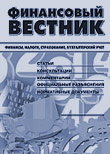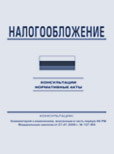Содержание
АКТУАЛЬНО
В.Г. Ойкин, первый заместитель председателя Правительства Саратовской области – министр финансов Саратовской области, кандидат экономических наук
E-mail: finance-journal@mail.ru
В статье отмечается, что для выстраивания диалога власти и населения требуется понимание гражданами задач и функций государственного бюджета, своих прав и обязанностей по отношению к нему. В Саратовский области осуществляется проект повышения бюджетной грамотности населения, который рассчитан не на один год. Совместно с научным сообществом сформирован комплекс мер, отработаны механизмы и формы взаимодействия с гражданами. Необходимость и актуальность повышения бюджетной грамотности была подтверждена данными мониторинга общественного мнения жителей Саратовской области, приведенного в статье. Вместе с тем отмечено, что поскольку граждане не желают осознанно и самостоятельно повышать уровень своей компетентности в сфере бюджетных отношений, интерес к ней требуется формировать искусственно, что является необходимым условием для эффективности любых мероприятий по повышению бюджетной грамотности.
Ключевые слова: Саратовская область, бюджетная грамотность, бюджетные отношения, региональный проект повышения бюджетной грамотности, диалог власти и населения.
ФИНАНСЫ И БЮДЖЕТ: ПРОБЛЕМЫ И РЕШЕНИЯ
Г.В. Мараренко, начальник отдела регулирования субъектов рынка коллективных инвестиций Департамента инвестиционных финансовых посредников Банка России
E-mail: gleb-mar@yandex.ru
В работе на основании анализа международных стандартов управления государственными долговыми обязательствами и государственными финансовыми активами, разработанными МВФ, Всемирным банком и ОЭСР, выявлены основные тенденции изменения концептуальных подходов к обеспечению долговой устойчивости государства и предложены пути их имплементации в России. В частности, показана необходимость проведения стресс-тестирования портфеля государственных долговых обязательств в среднесрочной перспективе, осуществления анализа долгосрочной долговой устойчивости государства и учета рисков реализации имплицитных долговых обязательств в ходе управления государственным долгом. Кроме того, обоснована необходимость учета взаимного влияния аллокации государственных финансовых активов и государственных долговых обязательств на долговую устойчивость государства путем проведения анализа устойчивости чистой финансовой позиции государства по модели SALM.
Ключевые слова: долговая устойчивость государства, управление государственными долговыми обязательствами, управление государственными финансовыми активами, стресс-тестирование портфеля государственных долговых обязательств, анализ устойчивости чистой финансовой позиции государства (SALM).
КАЗНАЧЕЙСТВО: СТАНОВЛЕНИЕ И РАЗВИТИЕ
Р.Ш. Чениб, руководитель УФК по Республике Адыгея, кандидат экономических наук, доцент
E-mail: ufk76@roskazna.ru
Н.Х. Шеуджен, начальник отдела кассового обслуживания исполнения бюджетов УФК по Республике Адыгея
E-mail: ufk76@roskazna.ru
В данной статье рассматриваются практические аспекты и проводится анализ эффективности управления финансовыми ресурсами субъектов и муниципальных образований посредством применения механизмов централизации остатков на их единых счетах и бюджетных кредитов на их пополнение на примере Управления Федерального казначейства по Республике Адыгея.
Ключевые слова: Единый счет, бюджет субъекта, местный бюджет, государственные учреждения, централизация, ликвидность.
НАЛОГИ: ТЕОРИЯ И ПРАКТИКА
В.Г. Пансков, профессор Департамента налоговой политики и таможенно-тарифного регулирования Финансового университета при Правительстве РФ, доктор экономических наук, заслуженный экономист России, государственный советник I ранга
E-mail: 5868116@mail.ru
С 1.01.2021 вводится дополнительная ставка НДФЛ в размере 15%, по которой будет облагаться годовой доход физических лиц, превышающий 5 млн рублей. Фактически это означает конец двадцатилетней монополии плоской шкалы налогообложения физических лиц и введение в российской налоговой системе прогрессивной шкалы индивидуального подоходного налога, пишет автор. Но останавливаться на этом нельзя. Автор намечает последующие меры, включая семейное налогообложение, внедрение культуры подготовки налоговых деклараций и коренную перестройку системы налогообложения физлиц, которая должна отвечать принципам справедливости и сокращать неравенство различных слоев населения.
Ключевые слова: НДФЛ, новая ставка, прогрессия в налогообложении, социальная справедливость как принцип налогообложения.
С.В. Разгулин, действительный государственный советник РФ 3 класса
E-mail: minfin608@rambler.ru
Правоприменительная практика показывает, что учет расходов на рекламу вызывает у налогоплательщиков сложности, которые во-многом связаны с нормированием отдельных видов рекламных расходов. Статья посвящена некоторым вопросам налогового учета рекламных расходов и предложениям по совершенствованию соответствующего порядка.
Ключевые слова: налоговый учет, расходы на рекламу, виды расходов, законодательные нормы.
Н.Ю. Корниенко, заведующая Лабораторией развития налоговой системы РАНХиГС при Президенте Российской Федерации, кандидат юридических наук
E-mail: kny@ranepa.ru
Г.А. Королев, старший научный сотрудник лаборатории развития налоговой системы РАНХиГС, кандидат юридических наук
E-mail: кorolev@ranepa.ru
В январе 2016 г. Европейский союз представил предложение о включении некоторых базовых мер против размывания налоговой базы в налоговые системы стран-членов ЕС для выравнивания правового положения между ними. Антиуклонительная директива устанавливает правила против уклонения от уплаты налогов, которые напрямую влияют на функционирование внутреннего рынка ЕС. Принимая новый комплекс правовых норм, Совет ЕС создал основу для усложнения налоговых систем стран-членов.
Ключевые слова: размывание налоговой базы и перемещение прибыли, ЕС, BEPS, уклонение от уплаты налогов, гармонизация норм, контролируемые иностранные компании, КИК.
СТРАХОВАНИЕ
А.А. Цыганов, руководитель Департамента страхования и экономики социальной сферы, Финансовый университет при Правительстве РФ, доктор экономических наук, профессор
E-mail: tsyganov@list.ru
А.Д. Языков, член совета директоров СК Югория, ведущий научный сотрудник департамента, кандидат экономических наук,
Е.А. Яненко, ответственный актуарий, генеральный директор OOO «Международная актуарная компания»
В системе тарификации ОСАГО присутствует целый ряд коэффициентов, которые должны учесть те или иные рисковые особенности эксплуатации автотранспортных средств. Наиболее дискуссионным из них является коэффициент территории преимущественного использования транспортного средства (КТ), который привязан в большинстве случаев к конкретному населенному пункту или региону. В статье показаны причины разбалансированности системы ОСАГО по региональному принципу и предложены пути решения данной проблемы на основе данных РСА и Банка России. Гипотеза исследования следующая: существенное расширение тарифного коридора вплоть до отмены территориального коэффициента не приведут к значимому повышению тарифов, но помогут справиться с недобросовестной практикой в сфере ОСАГО.
Ключевые слова:страхование, риск, страховщик, ОСАГО, брутто-премия, территориальный коэффициент, автообеспеченность, аварийность, убыточность, актуарный расчет, обобщенная линейная модель.
Т.А. Плахова, доцент Финансового университета при Правительства РФ, кандидат экономических наук
E-mail: taplakhova@fa.ru
В статье рассматривается проблема формирования стратегии развития страховой компании в условиях конкурентного и нестабильного финансового
рынка, обозначены основные этапы ее разработки и реализации, а также отличительные особенности различных стратегий с точки зрения их качества проработанности.
Ключевые слова: стратегия, страховая организация, страховой рынок, андеррайтинг.
ФИНАНСОВЫЙ МЕНЕДЖМЕНТ
А.И. Бородин, профессор кафедры финансового менеджмента РЭУ им. Г.В. Плеханова, доктор экономических наук
E-mail: Borodin.AI@rea.ru
О.В. Литвишко, доцент кафедры финансового менеджмента РЭУ им. Г.В. Плеханова, кандидат экономических наук
E-mail: Litvishko.OV@rea.ru
Статья посвящена исследованию проблем развития спорта в России и повышению эффективности управления в данной индустрии. Одной из таких проблем является отсутствие мотивации менеджмента к поиску рыночных источников финансирования деятельности субъекта профессионального спорта ввиду наличия доступа к бюджетным средствам и ресурсам квазигосударственных компаний. В статье сформулированы основные направления развития отрасли, в том числе в контексте введения УЕФА правил финансовой дисциплины, определены механизмы роста конкурентоспособности и финансовой эффективности субъектов профессионального спорта за счет перехода клубов на ценностно-ориентированный подход к управлению.
Ключевые слова: профессиональный спорт, эффективность, управление, финансирование, конкурентоспособность, бизнес-модель, инфраструктура.
НАУЧНЫЕ ИССЛЕДОВАНИЯ АСПИРАНТОВ И СОИСКАТЕЛЕЙ
Е.В. Алдухова, аспирант Школы финансов факультета экономических наук Национального исследовательского университета «Высшая школа экономики»
E-mail: Aldukhova.evgeniya@gmail.com
Активное распространение внутренней оценки рисков и платежеспособности (ORSA) для страховых компаний в мире было обусловлено в том числе появлением соответствующих требований от Международной ассоциации органов страхового надзора, изложенных в документе МАСН «Основные принципы страхования» еще в октябре 2010 г. Страховое законодательство в последние годы стало объектом реформирования во многих странах на предмет внедрения риск-ориентированного подхода. 1.01. 2016 г. можно считать точкой бифуркации для страхового рынка в целом, так как с этого момента новый режим платежеспособности вступил в силу и на территории Европейского союза (Solvency II), и в Китае. Схожие принципы в регулировании платежеспособности страховых организаций к тому моменту уже были внедрены в США и странах за пределами Европы.. При этом в каждой из них органы надзора при разработке законодательства делали внутреннюю оценку рисков страховщика неотъемлемой частью системы управления его платежеспособностью.
Ключевые слова: внутренняя оценка, платежеспособность, надзор и законодательство, МАСН, Solvency II.
Content
TOPICAL
V.G. Oikin, first deputy chairman of the government of the Saratov Region, Minister of finance of the region, candidate of economic sciences
E-мail: Finance-journal@mail.ru
The article notes that to build a dialogue between the authorities and the population, citizens need to understand the tasks and functions of the state budget, their rights and obligations in relation to it. In the Saratov region a project is being implemented to improve the budget literacy of the population, with the participation of the scientific community a set of measures is being carried out. Mechanisms and forms of interaction have been worked out. The need and relevance of increasing budget literacy was confirmed by the data from monitoring the public opinion of the inhabitants of the region. It was noted that since citizens are not ready to consciously and independently increase their level of competence in the field of budgetary relations, interest in it must be artificially generated.
Keywords: Saratov Region, budget literacy, budget relations, regional project to improve budget literacy, dialogue between the authorities and the population.
FINANCE AND BUDGET: PROBLEMS AND SOLUTIONS
G.V. Mararenko, head of the Unit of collective investment market entities regulation of the Department of financial investment intermediaries of the Bank of Russia
E-mail: gleb-mar@yandex.ru
Based on the analysis of the international standards of public debt management and financial assets developed by the IMF, the World Bank and the OECD, the article presents the main trends in the methodological approaches to the maintaining of public debt sustainability and proposes their implementation in Russia. In particular, it points out the need for stress testing of the public debt portfolio in the medium term, the analysis of the long-term public debt sustainability and risk management of the implicit public debt. In addition, the article substantiates the necessity of accounting for the mutual influence of public financial assets and debt allocation on the public debt stability by sovereign asset liability management (SALM).
Keywords: public debt sustainability, public debt management, public financial assets management, stress testing of the government debt portfolio, sovereign asset liability management (SALM).
TREASURY: FORMATION AND DEVELOPMENT
R.Sh. Chenib, head of the FTD of the Republic of Adygea, candidate of economic sciences, full associate professor
E-mail: ufk76@roskazna.ru
N.Kh. Sheudzhen, head of the Department of the cash execution of the budget of the FTD of the Republic of Adygea
E-mail: ufk76@roskazna.ru
This article examines practical aspects and analyzes the effectiveness of financial resources management of regions and municipalities through the use of mechanisms for centralizing balances on their single accounts and budget loans for their replenishment as exemplified by the Federal Treasury of the Republic of Adygea.
Keywords: single account, regional budget, local budget, government agencies, centralization, liquidity.
TAXES: THEORY AND PRACTICE
V.G. Panskov, professor at the Department of tax policy and customs tariff regulation of the Financial university under the Government of the Russian Federation, doctor of economic sciences, honored economist of the RF, the RF state adviser of 1st Class
E-mail:5868116@mail.ru
As from January 1, 2021, an additional personal income tax rate of 15% will be introduced and it will be applied to the annual income of individuals in excess of 5 million rubles. This means an end of the twenty-year monopoly of the flat scale of taxation of individuals and the introduction of a progressive scale of individual income tax in the Russian tax system. The author outlines next steps, including family taxation, the introduction of the culture of tax filing and a fundamental restructuring of the tax system for individuals to be fair and aimed at reduction of social inequality across the population.
Keywords: personal income tax, new rate, progression in taxation, social justice as a principle of taxation.
S.V. Razgulin, The RF State Current Adviser of 3rd Class
E-mail: minfin608@rambler.ru
Law enforcement practice shows that accounting for advertising costs causes difficulties for taxpayers, which are largely associated with the rationing of certain types of advertising costs. The article is devoted to some issues of tax accounting of advertising costs and contains proposals for improving the relevant procedure.
Keywords: tax accounting, advertising expenses, types of expenses, legislative norms.
N.Yu. Kornienko, head of the Laboratory for the development of the tax system of the Russian academy of national economy and public administration under the President of Russia, candidate of law
E-mail: kny@ranepa.ru
G.A. Korolev, senior research fellow at the laboratory, for the development of the tax system of the Russian academy of national economy and public administration under the President of Russia, candidate of law
E-mail: кorolev@ranepa.ru
In January 2016, the European Union presented a proposal to incorporate some base erosion counter measures into the EU member states tax systems to level the playing field between them. The Anti-tax avoidance directive (ATAD) lays down new rules against tax avoidance that directly affect the functioning of the EU market and relevant national legislation. By adding the new set of rules, the EU council is adding a measure of complexity to the European system.
Keywords: base erosion and profit shifting, EU, BEPS, tax evasion, harmonization of norms, controlled foreign companies, CFC regulation.
INSURANCE
A.A. Tsyganov, doctor of economics, full professor, head of Department of Insurance and Social Sphere Economics, Financial University under the Government of the Russian Federation
E-mail: tsyganov@list.ru
A.D.Yazykov, leading researcher at the department, member of the board of directors of Yugoria insurance company
E-mail: ADYazykov@fa.ru
E.A. Yanenko, chief actuary, general director at International actuarial advisory company, LLC
E-mail: yanenko@iaac.ru
The MTPL rating system has a number of factors that are designed to take into account certain risk features of the operation of vehicles. The most controversial of them is the coefficient of the territory of the preferential use of the vehicle (CT), which in most cases is linked to a specific locality or region through a special table established by the market regulator.
The article shows the reasons for the imbalance of the MTPL system according to the regional principle and suggests ways to overcome this problem. The basis for the calculations was the official data of the Bank of Russia and the Russian Association of motor insurers, which made it possible to analyze the dynamics of changes in the main indicators of the CMTPL market differentiated by territorial segments.
The hypothesis of the study is a significant expansion of the tariff corridor and the abolition of the territorial coefficient will not lead to higher tariffs, but will help to cope with the unfair practice of receiving excessive insurance payments in “toxic” regions. In continuation of the work published in 2019 on the bonus malus system in the Russian insurance, the material presents the results of a study of one of the key parameters of tariff formation in compulsory motor third party liability insurance - the factor of territory of preferential use (CT).
Keywords: MTPL, insurance, risk, insurer, gross premium, territorial coefficient, auto-availability, accident rate, loss ratio, actuarial calculation, generalized linear model.
T.A. Plakhova, associate professor at the Financial university under the Government of the Russian Federation, candidate of economic sciences
Subject of article is the development strategy of an insurance company, its formation and implementation, the role of different factors in domestic market competition and influence on it of the non-stable financial system. The quality of strategy and its relevance are considered as well.
Keywords: insurance carrier, insurance market, price competition, underwriting.
FINANCIAL MANAGEMENT
A.I. Borodin, professor at the Department of financial management of the Plekhanov Russian university of economics, doctor of economic sciences
E-mail: Borodin.AI@rea.ru
O.V. Litvishko, associate professor at the department, candidate of economic sciences
E-mail: Litvishko.OV@rea.ru
The article is devoted to the study of the problems of the development of sports in Russia and the improvement of management efficiency in this industry. One of these problems is the lack of motivation of management to search for market sources of financing the activities of a professional sports entity due to the availability of access to budget funds and resources of quasi-state companies. The article formulates the main directions for the development of the industry, within the context of the introduction of UEFA rules for financial discipline, defines the mechanisms for increasing the competitiveness and financial efficiency of professional sports entities due to the transition of clubs to a value-oriented approach to management.
Keywords: professional sports, efficiency, management, financing, competitiveness, business model, infrastructure.
SCIENTIFIC RESEARCHES OF POSTGRADUATE STUDENTS AND POSTGRADUATE DEGREE SEEKERS
E.V. Aldukhova, postgraduate student at the School of finance at the Faculty of economic sciences of the Higher school of economics
E-mail: Aldukhova.evgeniya@gmail.com
The active spread of the own risk and solvency assessment (ORSA) for insurance companies in the world was due, among other things, to the emergence of the relevant requirements from the International association of insurance supervision set out in the IAIS document «Basic principles of insurance» back in October 2010. Insurance legislation in recent years has undergone reforms in many countries in favor of introduction of a risk-based approach. January 1, 2016 can be considered as a bifurcation point for the insurance market as a whole, since from that moment on the new solvency regime entered into force both in the European union (Solvency II) and in China. By that time, similar principles in regulating the solvency of insurance organizations had already been implemented in the United States and a number of countries outside Europe. In each of them in the process of drafting the legislation the supervisory authorities made an internal assessment of the insurer's risks an integral part of its solvency management system.
Keywords: internal assessment, solvency, supervision and legislation, IAIS, Solvency II.













